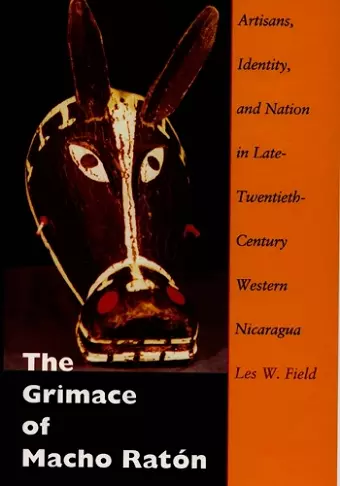The Grimace of Macho Ratón
Artisans, Identity, and Nation in Late-Twentieth-Century Western Nicaragua
Format:Hardback
Publisher:Duke University Press
Published:4th Feb '99
Currently unavailable, and unfortunately no date known when it will be back

In this creative ethnography Les W. Field challenges a post-Sandinista national conception of identity, one that threatens to constrict the future of subaltern Nicaraguans. Drawing on the works and words of artisans and artisanas, Indians, and mestizos, Field critiques the national ideology of ethnic homogeneity and analyzes the new forms of social movement that have distinguished late-twentieth-century Nicaragua. As a framework for these analytic discussions, Field uses the colonial-era play El Güegüence o Macho Ratón and the literature relating to it.
Elite appropriations of El Güegüence construe it as an allegory of mestizo national identity in which mestizaje is defined as the production of a national majority of ethnically bounded non-Indians in active collaboration with the state. By contrast, Field interprets the play as a parable of cultural history and not a declaration of cultural identity, a scatological reflection on power and the state, and an evocation of collective loss and humor broadly associated with the national experience of disempowered social groups. By engaging with those most intimately involved in the performance of the play—and by including essays by some of these artisans—Field shows how El Güegüence tells a story about the passing of time, the absurdity of authority, and the contradictions of coping with inheritances of the past. Refusing essentialist notions of what it means to be Indian or artisan, Field explains the reemergence of politicized indigenous identity in western Nicaragua and relates this to the longer history of artisan political organization. Parting ways with many scholars who associate the notion of mestizaje with identity loss and hegemony, Field emphasizes its creative,
productive, and insightful meanings. With an emphasis on the particular struggles of women artisans, he explores the reasons why forms of collective identity have posed various kinds of predicaments for this marginalized class of western Nicaraguans.
This book will appeal to readers beyond the field of Latin American anthropology, including students and scholars of literature, intellectual history, women’s studies, and the politics of ethnicity.
“The Grimace of Macho Ratón will make a stimulating addition to anthropological interpretations of nationalism and ethnicity, as well as to the broader Latin Americanist literature on the relationship between intellectual production and cultural policy in the modern era.”—Joanne Rappaport, Georgetown University
“Field’s study of small-town and rural artisans meets an evident need in the literature on Nicaragua. This innovative, stimulating, and important book is a prime example of the ‘new ethnography’: theoretically sophisticated, critical of the anthropological enterprise yet empirically rich and grounded.”—Charles R. Hale, University of Texas at Austin
ISBN: 9780822322559
Dimensions: unknown
Weight: 667g
320 pages